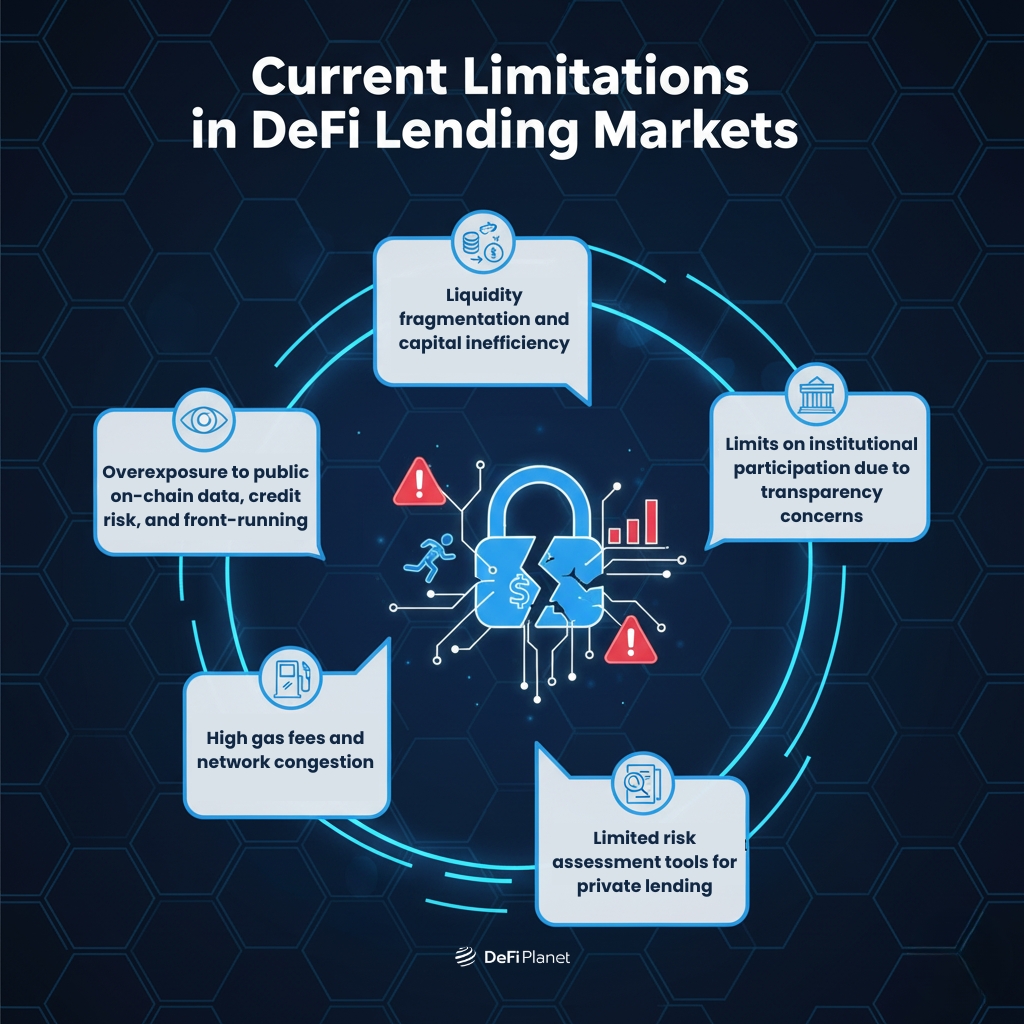Quick Breakdown
- Confidential DeFi lending keeps borrower and lender data private, reducing transparency risks and attracting institutional and high-net-worth investors who may otherwise avoid public DeFi markets.
- By enabling private cross-chain collateralization and higher lending volumes, confidential lending can improve asset utilization, liquidity, and overall market depth in DeFi.
- While promising, confidential lending faces regulatory uncertainty, technical vulnerabilities, operational complexity, and potential misuse, requiring careful oversight to ensure safe and widespread adoption.
Confidential lending in DeFi lets borrowers and lenders interact without revealing sensitive information. Unlike traditional loans or standard crypto lending, transaction details, balances, and loan amounts remain private through advanced encryption and privacy protocols.
These protocols allow users to deposit, borrow, and earn interest while keeping financial positions hidden. Using zero-knowledge proofs and other privacy-enhancing technologies, confidential lending protects data while maintaining trust and transparency, making it a potential avenue for larger capital inflows into DeFi.
Current Limitations in DeFi Lending Markets
Despite its growth, crypto lending still faces structural challenges that limit market efficiency, risk management, and broader adoption.

Liquidity fragmentation and capital inefficiency
DeFi liquidity is often scattered across multiple protocols, chains, and pools. This fragmentation prevents capital from being used efficiently, as lenders and borrowers may face mismatched opportunities or low utilization rates. It also makes interest rates inconsistent and can reduce overall market depth.
Overexposure to public on-chain data, credit risk, and front-running
Standard DeFi lending protocols rely on transparent on-chain data. While this ensures openness, it exposes users to risks such as front-running —where others exploit transaction information for profit —and credit risk, since borrower activity is easily tracked and targeted. Confidential mechanisms could help mitigate these vulnerabilities by keeping sensitive data private.
Limits on institutional participation due to transparency concerns
Many institutional investors avoid DeFi lending because public transaction histories and borrower data create privacy and compliance concerns. Without confidentiality, institutions fear reputational risks, regulatory scrutiny, and exposure to market manipulation, which limit large-scale capital inflows.
High gas fees and network congestion
Popular DeFi networks like Ethereum face high transaction fees during peak usage. This increases the cost of crypto lending and borrowing, discourages smaller participants, and reduces overall market efficiency.
Limited risk assessment tools for private lending
Current DeFi lending protocols often rely on public data for risk evaluation. Confidential lending reduces visibility, which can make traditional risk assessment challenging unless advanced cryptographic tools or oracles are integrated to provide secure insights without exposing sensitive information.
Potential Scale and Value Unlocked by Privacy-Focused Lending
Confidential lending can remove a major barrier to institutional adoption: transparency of borrower and lender data. By keeping sensitive financial details private, high-net-worth individuals, family offices, and institutional investors may feel more confident participating in DeFi lending markets. Greater participation from these players could introduce billions or even trillions of new capital, significantly expanding market depth.
Increased lending volume, cross-chain collateralization, and asset utilization
Privacy-focused crypto lending can improve overall capital efficiency. Confidential protocols enable borrowers to pledge assets across multiple chains without exposing positions, unlocking new opportunities for cross-chain collateralization. Lenders can deploy funds more confidently, knowing risk is managed privately, leading to higher lending volumes and better asset utilization across the DeFi ecosystem.
Several DeFi projects are already exploring privacy-enhanced lending:

- Secret Network: Enables encrypted smart contracts, letting protocols offer confidential loans and collateral management.
- Aztec: Uses zero-knowledge proofs to hide transaction amounts while maintaining protocol integrity.
- Railgun: Allows private DeFi interactions, including lending and borrowing, without revealing balances or transaction histories.
Risks, Regulatory Concerns, and Adoption Challenges
While confidential lending offers promising opportunities for DeFi, it also introduces new risks and challenges that must be carefully managed for safe and widespread adoption.
Potential misuse for money laundering or illegal activities
The privacy features that protect borrowers and lenders could also be exploited by bad actors to conceal illicit transactions. Without proper oversight, confidential lending platforms might unintentionally facilitate money laundering, fraud, or other illegal activities, drawing regulatory attention.
Regulatory uncertainty across jurisdictions
Different countries have varying rules around Know Your Customer (KYC) and Anti-Money Laundering (AML) compliance. Confidential lending may complicate compliance because standard identification and reporting mechanisms are harder to enforce when transaction details are private, creating legal uncertainty for both users and protocol developers.
Technical risks: smart contract vulnerabilities, privacy exploits
Confidential lending relies on complex cryptographic tools and smart contracts. Bugs, coding errors, or weaknesses in privacy protocols could be exploited, leading to loss of funds or exposure of sensitive data. Continuous auditing and rigorous security testing are essential to mitigate these risks.
Market adoption hurdles and user trust considerations
Users may be hesitant to adopt confidential lending platforms due to unfamiliarity with privacy technologies or fear of losing visibility over their funds. Building trust through transparent governance, clear documentation, and community engagement is critical to encourage broader adoption.
Liquidity risks and limited interoperability
Privacy features can complicate liquidity management and cross-chain interactions. For example, confidential collateral may be harder to integrate with other DeFi protocols, potentially reducing market depth and flexibility.
Operational complexity for developers and users
Confidential lending protocols often require advanced cryptography and specialized user interfaces. The higher technical complexity can create barriers for both developers and end users, slowing onboarding and network growth.
Potential higher costs for participants
Implementing privacy-enhancing technologies often comes with increased computational and transaction costs. This could make confidential crypto lending less attractive to smaller participants or reduce overall efficiency compared to standard DeFi lending platforms.
Conclusion – Future of Confidential DeFi Lending
Confidential lending offers a promising path for unlocking vast amounts of capital by allowing users to borrow and lend without exposing sensitive financial information. Its ability to protect balances, transaction histories, and loan details could attract both retail and institutional participants, significantly expanding the DeFi ecosystem.
At the same time, balancing privacy with regulatory compliance and risk management will be crucial for sustainable growth. If executed carefully, confidential crypto lending could become a cornerstone of next-generation DeFi, driving innovation, increasing trust, and supporting larger-scale capital inflows across the Ethereum and broader crypto ecosystem.
Disclaimer: This article is intended solely for informational purposes and should not be considered trading or investment advice. Nothing herein should be construed as financial, legal, or tax advice. Trading or investing in cryptocurrencies carries a considerable risk of financial loss. Always conduct due diligence.
If you would like to read more articles like this, visit DeFi Planet and follow us on Twitter, LinkedIn, Facebook, Instagram, and CoinMarketCap Community.
Take control of your crypto portfolio with MARKETS PRO, DeFi Planet’s suite of analytics tools.”





















